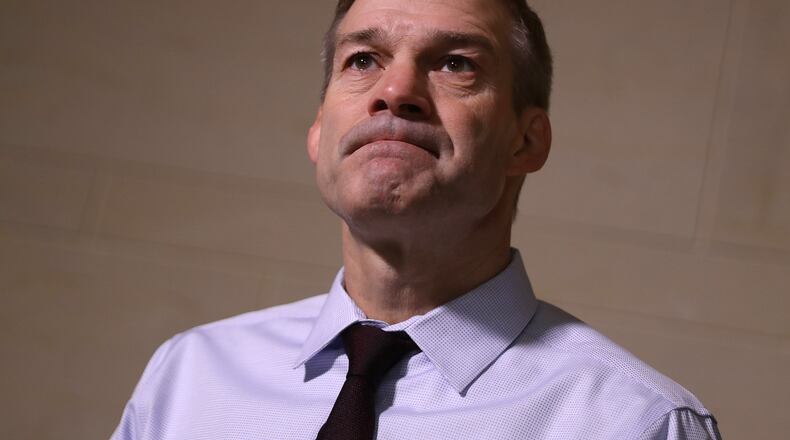Jordan is the top Republican on the House Oversight and Reform Committee. According to the Washington Post, House Minority Leader Kevin McCarthy may add Jordan to the House Permanent Select Committee on Intelligence Committee which will be in charge of public hearings tied to the impeachment inquiry.
Democrats announce public hearings
Democrats announced Wednesday they will launch public impeachment hearings next week, intending to bring to life weeks of closed-door testimony and lay out a convincing narrative of presidential misconduct by Donald Trump.
First to testify will be William Taylor, the top diplomat in Ukraine, who has relayed in private his understanding that there was a blatant quid pro quo with Trump holding up military aid to a U.S. ally facing threats from its giant neighbor Russia.
That aid, at the heart of the impeachment inquiry, is alleged to have been held hostage until Ukraine agreed to investigate political foe Joe Biden and the idea, out of the mainstream of U.S. intelligence findings, that Ukraine interfered in the 2016 U.S. election.
The testimony of Taylor a career envoy and war veteran with 50 years of service to the U.S., is what Democrats want Americans to hear first.
Taylor has told investigators about an "irregular channel" that the president's personal lawyer, Rudy Giuliani, set up for Ukraine diplomacy, and how the White House was holding up the military aid, according to a transcript of his closed-door interview released Wednesday.
“That was my clear understanding, security assistance money would not come until the president committed to pursue the investigation,” Taylor said.
He was asked if he was aware that “quid pro quo” meant “this for that.”
“I am,” he replied.
Trump has denied any wrongdoing, and Republicans largely dismiss the impeachment inquiry, now into its second month, as a sham.
But Rep. Adam Schiff, the chairman of the Intelligence Committee leading the probe, said that with two days of hearings next week Americans will have a chance to decide for themselves.
“The most important facts are largely not contested,” the California Democrat said. “Those open hearings will be an opportunity for the American people to evaluate the witnesses for themselves, to make their own determinations about the credibility of the witnesses, but also to learn firsthand about the facts of the president’s misconduct.”
Along with Taylor, the public will hear from former U.S. Ambassador to Ukraine Marie Yovanovitch, whom Trump fired after what she and others say was a smear campaign against her, and career State Department official George Kent. Taylor and Kent will appear Wednesday, Yovanovitch on Friday.
To prepare for what’s ahead, the White House is beefing up its communications operations.
Trump ally Pam Bondi, the former attorney general of Florida, and Tony Sayegh, a former Treasury Department spokesman, are expected to join the White House team to work on “proactive impeachment messaging,” a senior administration official told The Associated Press. The official spoke on condition of anonymity to discuss internal staffing.
The Trump administration has ordered officials not to participate in the House inquiry. But lawmakers have spent weeks hearing from current and former government witnesses, largely from the State Department, as one official after another has relayed his or her understanding of events.
The testimony from Taylor further connected Trump, Giuliani and the administration to a quid-pro-quo agreement that came to light after a government whistleblower's complaint about Trump's July 25 phone call with Ukraine President Volodymyr Zelenskiy.
Even before that call, Taylor said, he and other diplomats involved in Ukraine policy started having concerns about a shadow foreign policy being run by Trump and his private attorney.
Taylor testified that the concerns reached high levels at the White House. In a July 10 meeting with Trump’s National Security Adviser John Bolton, Trump’s ambassador to the European Union, Gordon Sondland raised the idea of Ukrainian investigations.
That “triggered Ambassador Bolton’s antenna, political antenna, and he said ‘we don’t do politics here,’” Taylor testified, noting that Bolton ended the meeting.
Bolton, who resigned from the administration later, has been asked to appear before the House investigators for a closed-door interview this week. His lawyer said he would not come without a subpoena.
All three of those scheduled to appear in public hearings next week have already testified behind closed doors, and investigators in recent days started releasing hundreds of pages of transcripts from their interviews.
Mary Clarke Jalonick, Lisa Mascaro and Eric Tucker of the Associated Press contributed to this report.
About the Author
